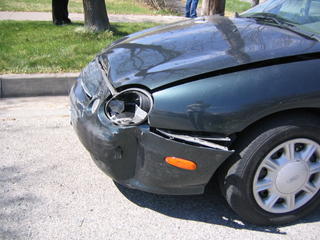Really, are you now doing that. That's wonderful Ford. Thanks for not focusing on safety before, as noted by the recent $4 million a South Carolina jury has ordered Ford to pay in a Rollover Suit. Why should Ford pay for a woman who was killed when her Ford Explorer Rolled Over? Well, as the article states, because:
"As far back as 1989, Ford Motor Company knew that this Explorer had rollover
problems," Ed Bell, the Hayward family's lawyer, told jurors in Charleston,
S.C.
"Ford knew of potentially fatal defects during the development and
manufacture
of this vehicle and chose not to remedy them."
Now, this lawsuit represents one of hundreds if not thousands of lawsuits against Ford right now. In fact, as I write this, I recall an accident I saw last summer, wherein a Ford Explorer, going no more than 35 mph rolled over after hitting a car. Now, I'll be the first to admit that even cars in the proper circumstances could easily roll when going 35 mph if conditions are right. However, what was bothersome to me was the roof and how the A-pillars collapsed, rather than supporting the roof. Please see this picture I took at the scene.

 Now, the real kicker is the other car that was involved in the accident. It was barely damaged. The Exploder side-swiped the car and rolled in response. Look at the minimal damage on the other car.
Now, the real kicker is the other car that was involved in the accident. It was barely damaged. The Exploder side-swiped the car and rolled in response. Look at the minimal damage on the other car.

But, I digress.
The point is Ford has failed to prove that Safety ever was an incredibly, sincere, pervasive-in-their-culture concern. Look, we're talking about deliberate disregard by Ford executives when given information that the best-selling SUV in the US (the Ford Exploder, errr, Explorer) has poor engineering in the roof-structure and could be prone to rollover.
Now, I'm not necessarily saying that Ford doesn't make good cars, or that the Exploder isn't a good vehicle for some people's needs. However, I am saying that the U.S. carmakers continue to flop where it really matters.
I fear that Ford, with this "innovation" campaign strategy may be getting suckered into the same PR garbage GM has been pumping out the last 5-6 years.
Now, to quote the article from AdAge:
The campaign’s “Innovation” theme reiterates the Ford heir’s recent speech on
the topic. “Innovation will be the compass that guides this company going
forward,” Mr. Ford says in both the 60- and 30-second spots. He adds that Ford
has “dramatically recommitted” to hybrids, technology and safety.
Now, let's analyze the statement, "Ford has "dramatically recommitted" to hybrids, technology, and safety". I'm sorry, but the word recommitted draws up a bunch of quizzicall looks without any answers. Ok, mr Bill Ford, so what you really meant to say was, "we really kind of just dragged our feet along for a while. You know, we didn't care too much about safety, the environment, or safety, but you know, we all make mistakes. But, one day, I, yes, me Mr. Bill Ford had this great idea. Let's become innovative, recommit to developing hybrids (since Toyota and Honda have been kicking our butt with hybrids since their introduction in 2000)."
So it has taken Ford a while to respond to the competition. Granted, they do have some hybrids in their lineup, such as the Hybrid and Mariner. But, come on, who's kidding who? Why do you have to recommit? Surely you've been developing all this technology from the beginning. Right?
I'm not stating that Ford isn't developing their Safety, Technology, and Hybrids. However, why do you have to remind us about this through a PR/Advertising campaign. Why don't you spend your limited funds (given their most recent $1+ billion quarterly loss) on more valuable things such as new product, that will entice buyers.
Most customers these days are tired of the hyped up crap of automotive companies. What matters most to the customer is what they can buy on the lot, today, tomorrow, or in a couple months. We don't want to be told about some Revolutionary Strategy Shift in your company that you're going to start offering products that adress the issues I care about. Give me product and prove it, not some commercial stating such. And until then, I'll drive my import car; because, though it may not be as efficient as a hybrid, it is safer, more reliable, and at least equals all the "technology" any domestic vehicle offers in its class.
All I have to say is: Wow Ford, I can't wait to see what all this dramatically recommitted strategy is going to produce next. Yay!!